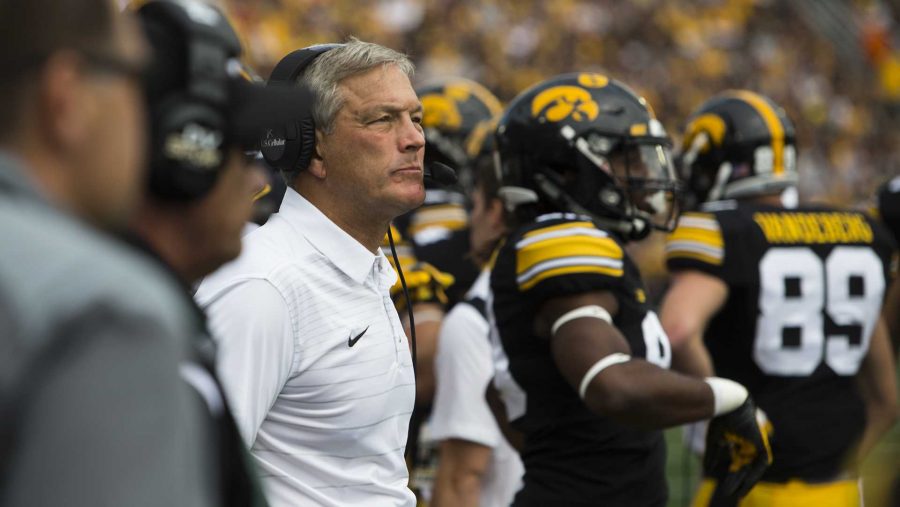Dear Coach Ferentz,
It is important that we acknowledge that the University of Iowa’s student population is 3.1 percent African American, yet the football team is 33 percent African American — yes, I counted the players and did the math. I think this is important to note because you have asked the players to step on the field and forget that they face inequity daily.
You told the players to go use their voices and platform to participate in community service, not acknowledging that the Iowa City community looks nothing like them, and when they step off the field, they are not greeted with open arms. That is because there are only approximately 1,000 black students on this campus. I ask you, when would those players have time to participate in community service? Among classes, practices, meetings, games, and traveling, when would their time permit? Are you going to carve out time of their schedules to allow them to actually go to an activist rally?
You forget that just last year, one of your players was stopped in the park with guns drawn on him because he “fit the description” while he was playing Pokemon Go. And yes, that player released a statement saying he knew the police were “just doing their jobs,” even though he feared for his life. But we all know that could have ended a completely different way because he did not originally comply; he had headphones on. A story like this has ended tragically for other black men who “fit the description” just like he did. But you are asking your black players to put all that aside when they step on the field.
You said that if players were to take a knee, they would just be following the crowd and not using their own minds. So those who followed Martin Luther King Jr. across that bridge in 1965 were not using their own minds? Did they not actively think about the sacrifices they were making — putting their lives on the line? For athletes to take a knee in this political climate, they are literally sacrificing their livelihood, and that decision is not made mindlessly.
Coach, you say that players should leave all the extra stuff behind and just play sports; however, you do not say that when we honor a Kid Captain every home game. Football is used as a platform to bring attention to different health issues that children around Iowa face. How is taking a knee any different? Historically, sports have been used as the vehicle to usher in change in this country. They have been the locomotive of the train of social justice. How is now any different?
RELATED: Baumann: Ferentz didn’t take a stand when he should have
To assume your players are immune to racism and bigotry just because they place a jersey on their back for one day a week is naïve. We saw the type of collective power a college football team could have in fighting for social justice in 2015 with the University of Missouri’s team taking a stand with students and refusing to play in a game. That spoke volumes. That enacted change on that campus. And that protest was peaceful. Coaches like yourself do not want players to kneel because you are unable to capitalize on this movement like you would with a pink jersey sold in a bookstore. The least you could do is acknowledge that your black players are first black and then they are players.
The jersey and the status does not change their skin color. It does not change the fact that this society is still unwelcoming to people of color. It should speak volumes to you and others that the majority of the black students on campus are athletes instead of students who are aspiring to be doctors, journalists, lawyers, artists, and a host of other things.
You are not afraid to use their black bodies on the field as long as they be quiet and don’t remind you that racism is brewing even in “liberal” Iowa City. Your players are not immune from being racially profiled by a cop, or a store owner, or a club doorman. One day, your players will not be able to play another down for you or any other coach — professional or collegiate — but the one thing they will never ever be able to stop doing is being black.
— Joy M. Woods
M.A. Student
Department of Educational Policy and Leadership Studies
College of Education Social Chair
Association for Black Graduate and Professional Students Student Assistant



